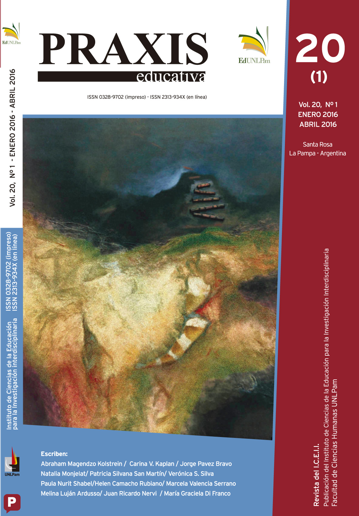Human rights in syllabus of citizenship education (civics)
DOI:
https://doi.org/10.19137/praxiseducativa-2016-200102Keywords:
citizenship, human rights, curricular matrix, Latin AmericaAbstract
This article tries to analyze the presence of Human Rights in the syllabus of Citizenship Education (Civics) of some Latin American countries. Thus, in this way, it detects the conceptions of citizen and citizenship supported; it reveals the rights the curriculum places emphasis on, and identifies the relationships between Human Rights and some citizenship categories which are essential as equality and personality development, freedom, democracy, justice and social protection, national identity and diversity respect, coexistence and international interdependence, peace valuation and the instruments to solve conflicts, security and protection of the environment. With this aim, the theory is related to the relationship between citizenship and human rights and how this relation is expressed in the curricular area. In second place, a “Matrix of Citizenship Categories” is applied to the curriculum guidelines to determine, in this way, convergences and divergences and mainly, to detect the tendencies that are observed in the treatment of Human Rights in the syllabus. Finally, the text points some suggestions about new aims of citizens training looking at the future, where Human Rights take a central place.Downloads
Downloads
Published
Issue
Section
License
Copyright Notice
Editorial Committee Educational Praxis Magazine:
I hereby declare that I am the author of the article titled (article name), that it is original and my own and that it was not previously published in any other format or medium. I declare to know that the magazine will not charge me any type of fee under any circumstances, nor will I receive any type of monetary compensation If it were accepted for publication in Educational Praxis, I authorize the aforementioned magazine to publish it digitally and to advertise it on its social networks.
If the work is published, I adhere to the Creative Commons license called "Attribution - Non-Commercial Share Alike CC BY-NC-SA", through which it is allowed to copy, reproduce, distribute, publicly communicate the work and generate derivative works, as long as when the original author is cited and acknowledged. This license has been used since September 2018. In 2016 CC BY NC ND 4.0 was adhered to; and in the years 2017 and 2018 (January-August) CC BY NC 4.0.
This CC BY-NC-SA Share Alike license does not, however, permit commercial use of the work. As an author, the journal may establish additional agreements for the non-exclusive distribution of the version of the work published in the journal, it allows me to self-archive the published articles, in their post-print version, in institutional, thematic repositories, personal web pages or any other relevant use. with the recognition of having been first published in this journal.
Educational Praxis adheres to DORA (Declaration on Research Assessment) signed in San Francisco, California, on December 16, 2012, and to the Declaration of Mexico (Joint Declaration LATINDEX - REDALYC - CLACSO - IBICT).















_(1)2.png)


3.png)











_(2).png)






2.jpg)









